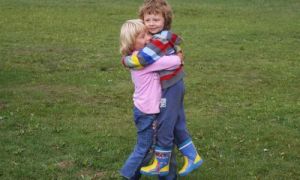Phonological awareness covers the child’s ability to recognize and use the spoken parts of sentences and words. The following article provides information on the main stages of the development of phonological skills in children.
Main Stages Of The Development Of Phonological Skills In Children
The developmental sequence of phonological skills typically progresses through several stages, each building on the previous one. Here are the main stages:
-
Word Awareness: This is the ability to track words in sentences. It’s a basic skill that helps children understand that sentences are made up of individual words.
At the simplest level, this refers to the ability to identify words in a sentence. For example, as students say, “I like cookies”, they clap each time they say a word. A higher word awareness skill is the ability to blend two words like ‘book’ and ‘store’ into a single word, ‘bookstore’. Then comes segmentation or the ability to differentiate smaller words like ‘book’ and ‘store’ in a big word, ‘bookstore’. The highest skill level in word awareness is deletion. So a teacher might ask students to say ‘bookstore’ and then tell them to say ‘bookstore’ without the ‘store’. If children are able to say ‘book’, then it indicates mastery of deletion level in word awareness skill.
-
Responsiveness to Rhyme and Alliteration: This involves recognizing and enjoying rhyming words and alliterative phrases. Children start to notice that some words sound similar at the end or the beginning.
-
Syllable Awareness: This is the ability to count, tap, blend, or segment words into syllables. It’s an important step in understanding the structure of words.
At the simplest blending level, children are able to put smaller word parts together to make a whole word like ‘pock’ and ‘et’ for ‘pocket’. Next comes segmentation which children are able to identify syllables perhaps by clapping to poc and ket in the word pocket. Then comes deletion level. So a teacher might ask students to say pocket and then tells them to say pocket without the et. If children are able to say pock, then it shows high syllable awareness.
-
Onset and Rime Manipulation: This involves recognizing and producing rhyming words by understanding that rhyming words have the same rime (the vowel and the letters that follow it in a syllable).
The third stage of phonological skills involves being able to recognize rhymes in worlds like pit, sit, etc. Next children are able to generate rhymes on their own like hit, bit. Then comes categorization when children are able to recognize which rhyme does not belong in a group, like bun in the group of hot, dot, bun, lot
-
Phoneme Awareness: This is the most advanced stage and involves identifying and manipulating individual sounds (phonemes) in words.
Phonemes are the basic units of a spoken language and awareness that language is composed of these small sounds is termed phonemic awareness. The basic level of phoneme awareness is isolation of individual sounds, like “what is the first sound in pan?” (/p/), “what is the last sound in pan?” (/n/) or “what is the middle sound in pan?” (/a/). Then comes the ability to identify a particular sound among disparate sounds, like “Which word has the same first sound as car: fan, corn, or map?” (corn) followed by the ability to categorize sounds like “Which word does not belong? bus, ball, house?” (house), including:
- Identifying and matching initial, final, and middle sounds in words.
- Segmenting and producing initial, final, and middle sounds.
- Blending sounds into words.
- Segmenting words into individual phonemes.
Understanding these stages helps in sequencing teaching tasks from easy to more difficult, ensuring that children develop strong phonological skills that are critical for reading and writing.
Strategies To Support Phonological Development In Young Children
Supporting phonological development in young children is crucial for their literacy and language skills. Here are some effective strategies:
-
Listening Activities: Engage children in activities that require them to listen carefully to sounds, syllables, and rhymes in words. For example, play games where they identify sounds in their environment or in spoken words.
-
Rhyming Games: Encourage children to recognize and produce rhyming words. Read books with rhymes and ask them to pick out the rhyming words. You can also play rhyming games where they have to find words that rhyme with a given word.
-
Syllable Clapping: Help children understand syllables by clapping out the syllables in words. For example, clap three times for the word “butterfly” (but-ter-fly). This helps them break down words into smaller parts.
-
Sound Manipulation: Teach children to manipulate sounds in words. This can include blending sounds to make words (e.g., /c/ /a/ /t/ makes “cat”) and segmenting words into individual sounds (e.g., “dog” is /d/ /o/ /g/).
-
Songs and Chants: Use songs, chants, and nursery rhymes to develop phonological awareness. Singing helps children hear the rhythm and sounds in language, making it easier for them to recognize patterns.
-
Word Games: Play word games that involve sound manipulation, such as “I Spy” with sounds (e.g., “I spy something that starts with /b/”). This helps children focus on the initial sounds of words.
-
Storytime: Read books that emphasize phonological patterns, such as alliteration and rhyming. Discuss the sounds and patterns you notice in the stories.
-
Interactive Activities: Use interactive activities like puzzles, crafts, and digital games that focus on phonological skills. These activities can make learning fun and engaging.
By incorporating these strategies into your daily routine, you can help young children develop strong phonological skills that are essential for reading and writing.
Further Reading
Developmental Sequence Of Phonological Skills Posters
The Importance Of Nursery Rhymes For Children
Rhymes Posters
Phonics Printables
References:
9 Ways To Build Phonological Awareness, Understood
Phonological Awareness, Improving Literacy
Phonological Awareness In Early Childhood, Literacy Worldwide
Development Of Phonological Skills, Reading Rockets







 Toddlers have a greater understanding of the world around them by this stage. Their cognitive development (also known as intellectual development and thinking skills) continues
Toddlers have a greater understanding of the world around them by this stage. Their cognitive development (also known as intellectual development and thinking skills) continues Infants begin to develop trust when parents begin to fulfil their needs. Such as changing an infant's nappy when needed, feeding on request and holding
Infants begin to develop trust when parents begin to fulfil their needs. Such as changing an infant's nappy when needed, feeding on request and holding Beginning at birth the construction of thought processes, such as memory, problem solving, exploration of objects etc, is an important part of an infant’s cognitive
Beginning at birth the construction of thought processes, such as memory, problem solving, exploration of objects etc, is an important part of an infant’s cognitive Toddlers want to do more on their own and do not like it when you begin to establish limits on their behaviour. Tantrums can become
Toddlers want to do more on their own and do not like it when you begin to establish limits on their behaviour. Tantrums can become Your preschooler is now able to focus their attention more accurately and is less influenced by distractions. The intensity of questions increase as your child
Your preschooler is now able to focus their attention more accurately and is less influenced by distractions. The intensity of questions increase as your child John Dewey is often seen as the proponent of learning by doing – rather than learning by passively receiving. He believed that each child was active,
John Dewey is often seen as the proponent of learning by doing – rather than learning by passively receiving. He believed that each child was active, Toddler advance and gains new skills in Gross Motor Development milestones achieved throughout earlier years. Co-ordination and challenges that could not be performed before such
Toddler advance and gains new skills in Gross Motor Development milestones achieved throughout earlier years. Co-ordination and challenges that could not be performed before such Erik Erikson developed a psychosocial theory to understand how we each develop our identities through eight stages of psychosocial development from infancy to adulthood. The
Erik Erikson developed a psychosocial theory to understand how we each develop our identities through eight stages of psychosocial development from infancy to adulthood. The At this point preschoolers begin to interact effectively with others. Play becomes more innovative and organized and “boyfriend” or “girlfriend” begins to emerge. Preschoolers have
At this point preschoolers begin to interact effectively with others. Play becomes more innovative and organized and “boyfriend” or “girlfriend” begins to emerge. Preschoolers have From now, babies begin to identify and respond to their own feelings, understanding other's feelings & needs and interact positively with others. A baby's social and
From now, babies begin to identify and respond to their own feelings, understanding other's feelings & needs and interact positively with others. A baby's social and


